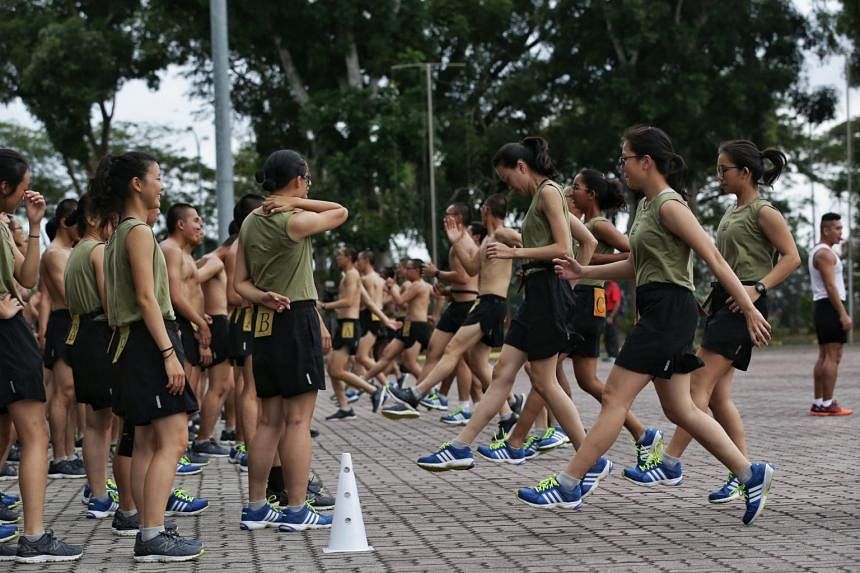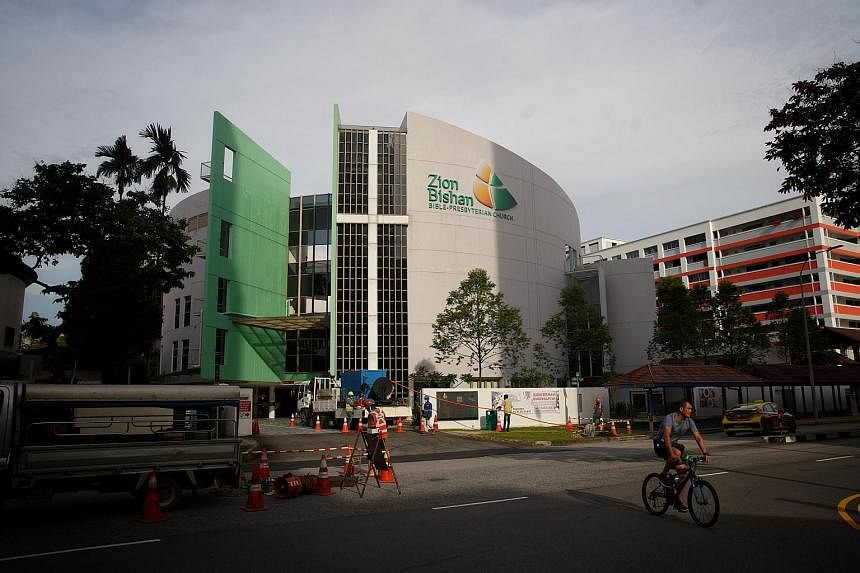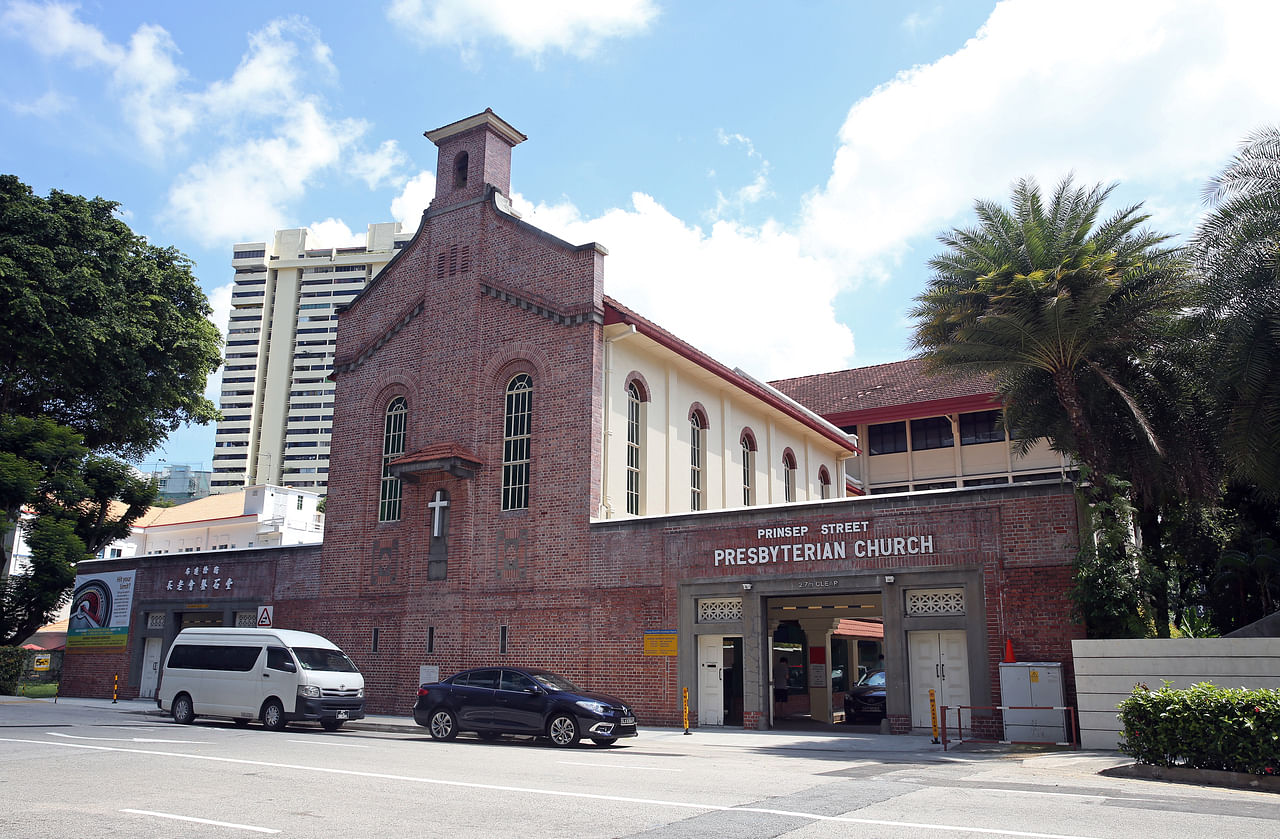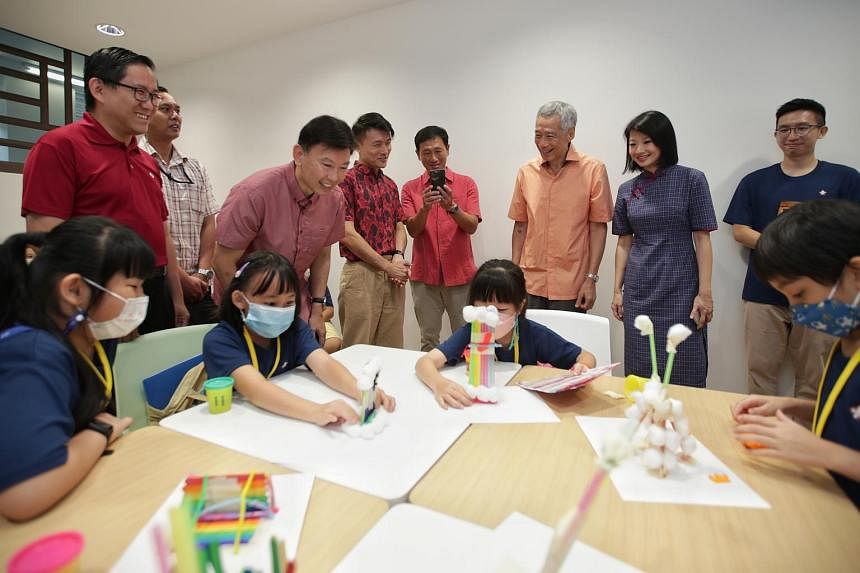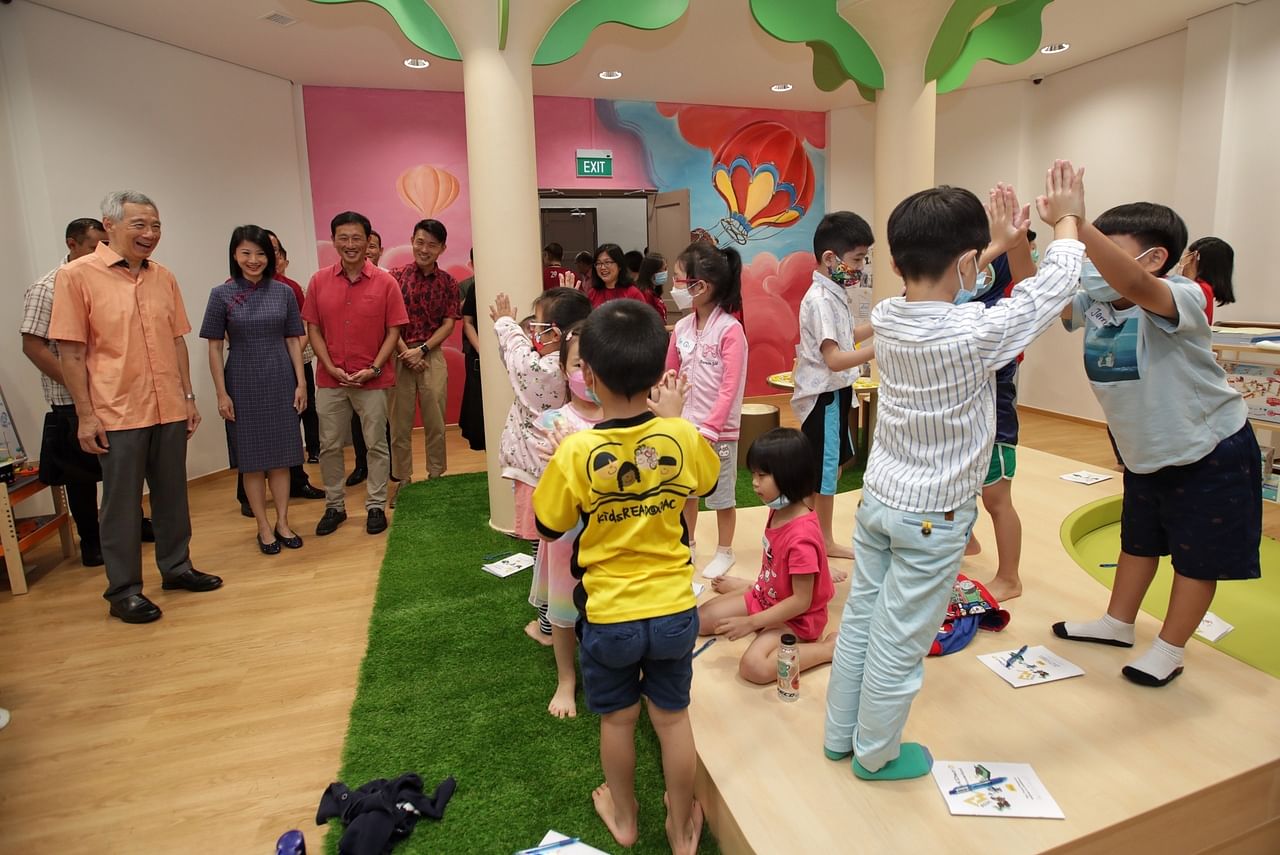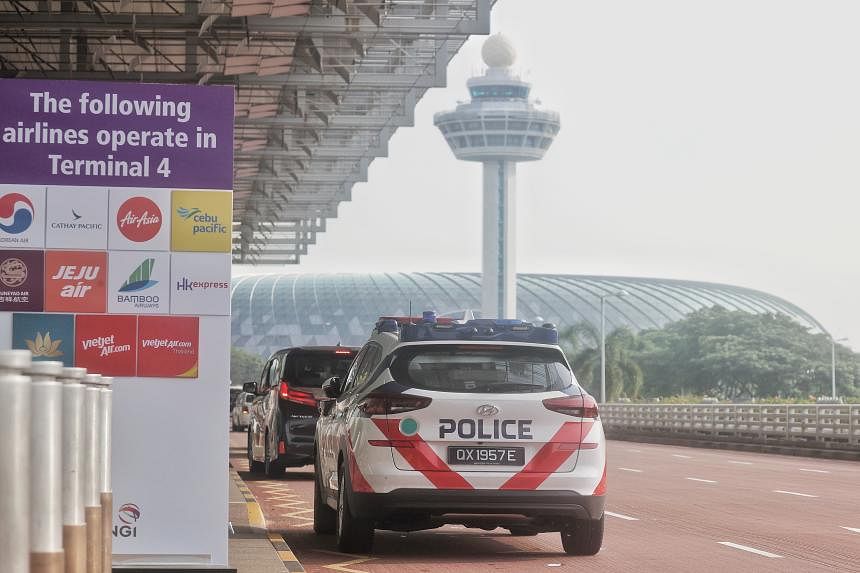To paraphrase Animal Farm: "All citizens are equal but some citizens (the vaccinated ones) are more equal than others."
There are reasons why a person chooses not to be vaccinated: no confidence in the vaccine, allergies, personal beliefs, religious beliefs etc.
On the one hand, the PAP government said no one will be forced to be vaccinated. On the other hand, the PAP government discriminates against those who choose not to be vaccinated with practices like this.


National Day Parade celebrations at the Marina Bay floating platform in 2018.

Lim Min Zhang
June 30, 2021
SINGAPORE - This year's National Day Parade (NDP) will return to the Marina Bay floating platform as a centralised, in-person event, but with fewer participants and spectators, said Defence Minister Ng Eng Hen on Monday (June 28).
Covid-19 precautions require all participants and spectators to be fully vaccinated, he said.
Performers must undergo antigen rapid testing before every rehearsal - even with rehearsals held in smaller groups - while spectators must undergo pre-event testing.
Dr Ng was speaking at Mandai Hill Camp ahead of SAF Day on July 1.
Earlier in the interview, he spoke about how the Singapore Armed Forces will adapt to a situation where Covid-19 will be endemic, and how large-scale national events could be carried out, with NDP as an example.
Asked why NDP was being held as an event with live performers and spectators despite persistent unlinked Covid-19 cases in the community, Dr Ng said: "Part of it is learning to live with the disease, an endemic disease. And by August, we hope two-thirds of our population would have received the vaccination."
In the first official comments about NDP 2021, he added: "The short answer is that we think it can be held safely, and it's an appropriate occasion to shift to living with the disease, but managing it so that you can get back to a new normal."
The new normal, in this instance, is not the usual crowd of 25,000, he said, adding that the NDP organising committee will give more details in a few days' time. The number of spectators will also be decided later, he said.
All spectators must be fully vaccinated. This refers to all those above 12 years old who are eligible for the national vaccination programme, he said.
Other than the usual combined parade and show, there will also be "heartland activities", he said, although he did not elaborate.
Last year, the NDP was held in a decentralised format, including a morning parade at the Padang and an evening show at Star Vista with far fewer participants than usual, as the organisers sought to avoid large crowds.
The evening show had involved 87 performers and about 150 spectators. This is in comparison to the more than 2,700 performers who were involved in NDP 2019's show segment.
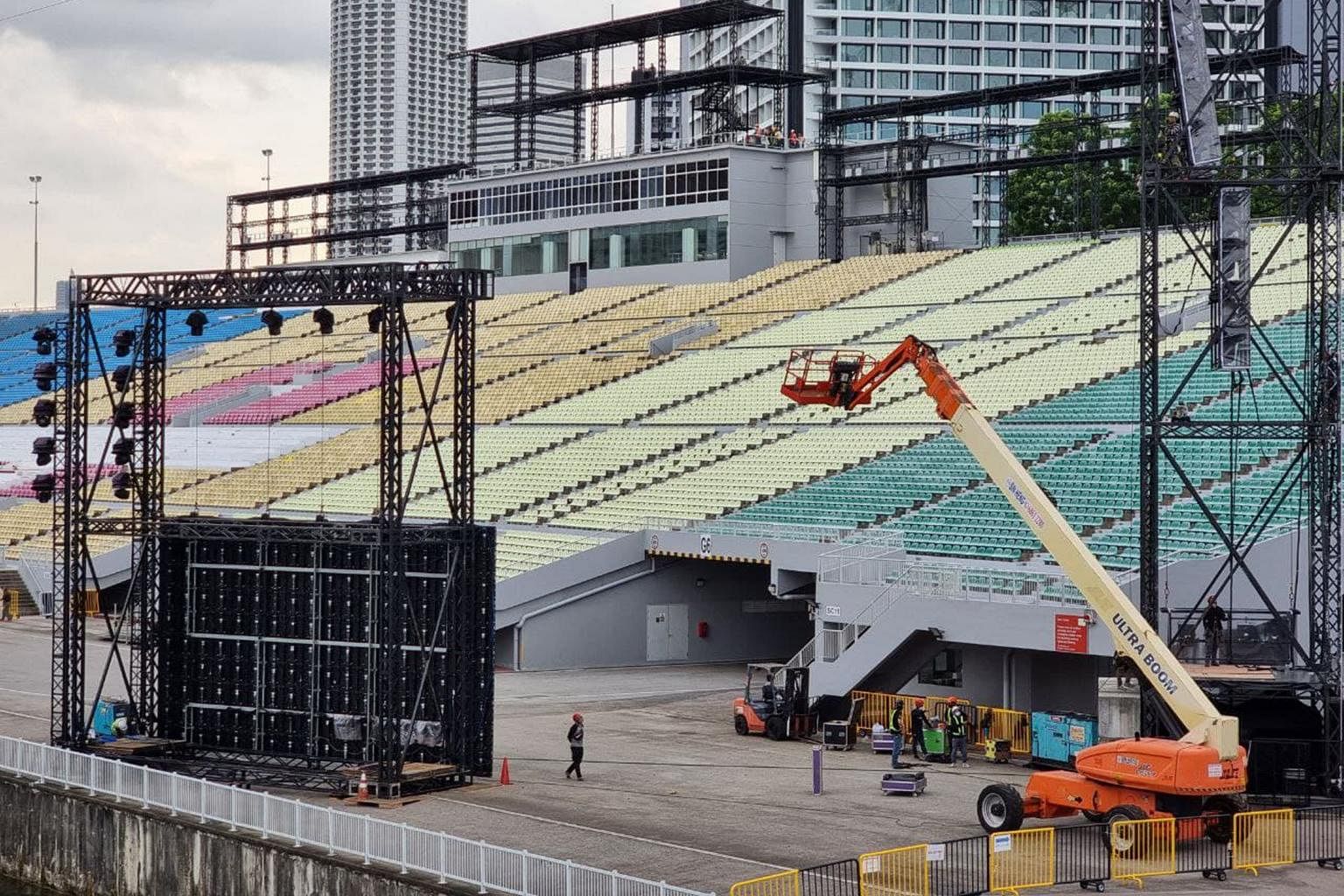 Structures being set up at the Marina Bay floating platform on May 27, 2021.
Structures being set up at the Marina Bay floating platform on May 27, 2021.
Asked if there would be fireworks displays, which could potentially lead to crowds forming, Dr Ng said that Singaporeans need to play their part, and that it would be better to watch any displays from their homes.
"I think there will be administrators and safety ambassadors on the ground to help enforce, but the new normal also means that Singaporeans must take their own measures to protect themselves, especially if they're not vaccinated."
Asked whether there was enough time to prepare the annual bash on Aug 9, Dr Ng said: "If you ask the organising chairman, he'll say 'it's never enough'. But he'll have to live with what he has."
He added: "We hope that Singaporeans will understand if the show isn't as well prepared as in previous years, we've had less time to prepare."
He noted that preparations usually start in April or May.
"But NDP is as much about each Singaporean using the occasion to affirm together what we value about Singapore. We hope that the NDP will uplift, we hope that the NDP will encourage.
"We hope that the NDP will give us a wider perspective, because it's been a tough year, a year and a half, and I think with Singaporeans' help, we can achieve it."
There are reasons why a person chooses not to be vaccinated: no confidence in the vaccine, allergies, personal beliefs, religious beliefs etc.
On the one hand, the PAP government said no one will be forced to be vaccinated. On the other hand, the PAP government discriminates against those who choose not to be vaccinated with practices like this.
NDP 2021 to be held at Marina Bay floating platform with fewer spectators; all must be vaccinated against Covid-19


National Day Parade celebrations at the Marina Bay floating platform in 2018.

Lim Min Zhang
June 30, 2021
SINGAPORE - This year's National Day Parade (NDP) will return to the Marina Bay floating platform as a centralised, in-person event, but with fewer participants and spectators, said Defence Minister Ng Eng Hen on Monday (June 28).
Covid-19 precautions require all participants and spectators to be fully vaccinated, he said.
Performers must undergo antigen rapid testing before every rehearsal - even with rehearsals held in smaller groups - while spectators must undergo pre-event testing.
Dr Ng was speaking at Mandai Hill Camp ahead of SAF Day on July 1.
Earlier in the interview, he spoke about how the Singapore Armed Forces will adapt to a situation where Covid-19 will be endemic, and how large-scale national events could be carried out, with NDP as an example.
Asked why NDP was being held as an event with live performers and spectators despite persistent unlinked Covid-19 cases in the community, Dr Ng said: "Part of it is learning to live with the disease, an endemic disease. And by August, we hope two-thirds of our population would have received the vaccination."
In the first official comments about NDP 2021, he added: "The short answer is that we think it can be held safely, and it's an appropriate occasion to shift to living with the disease, but managing it so that you can get back to a new normal."
The new normal, in this instance, is not the usual crowd of 25,000, he said, adding that the NDP organising committee will give more details in a few days' time. The number of spectators will also be decided later, he said.
All spectators must be fully vaccinated. This refers to all those above 12 years old who are eligible for the national vaccination programme, he said.
Other than the usual combined parade and show, there will also be "heartland activities", he said, although he did not elaborate.
Last year, the NDP was held in a decentralised format, including a morning parade at the Padang and an evening show at Star Vista with far fewer participants than usual, as the organisers sought to avoid large crowds.
The evening show had involved 87 performers and about 150 spectators. This is in comparison to the more than 2,700 performers who were involved in NDP 2019's show segment.

Asked if there would be fireworks displays, which could potentially lead to crowds forming, Dr Ng said that Singaporeans need to play their part, and that it would be better to watch any displays from their homes.
"I think there will be administrators and safety ambassadors on the ground to help enforce, but the new normal also means that Singaporeans must take their own measures to protect themselves, especially if they're not vaccinated."
Asked whether there was enough time to prepare the annual bash on Aug 9, Dr Ng said: "If you ask the organising chairman, he'll say 'it's never enough'. But he'll have to live with what he has."
He added: "We hope that Singaporeans will understand if the show isn't as well prepared as in previous years, we've had less time to prepare."
He noted that preparations usually start in April or May.
"But NDP is as much about each Singaporean using the occasion to affirm together what we value about Singapore. We hope that the NDP will uplift, we hope that the NDP will encourage.
"We hope that the NDP will give us a wider perspective, because it's been a tough year, a year and a half, and I think with Singaporeans' help, we can achieve it."
Last edited:









